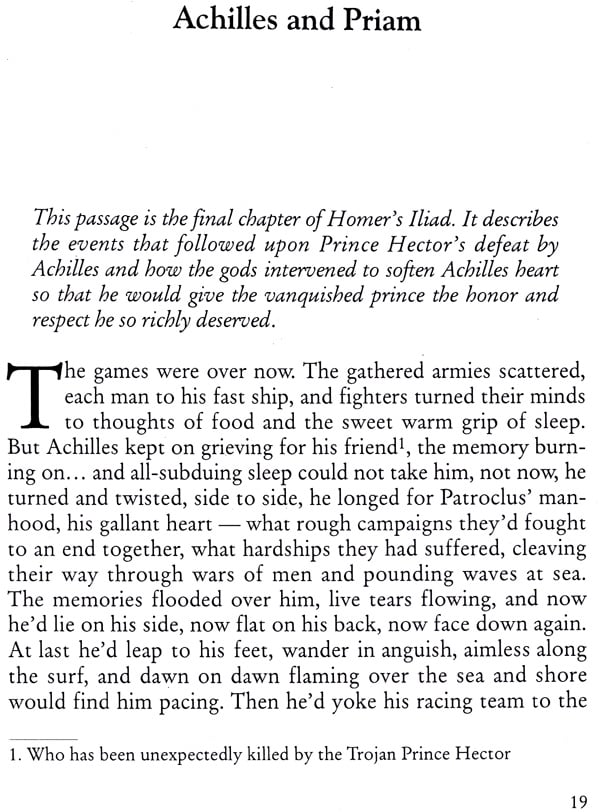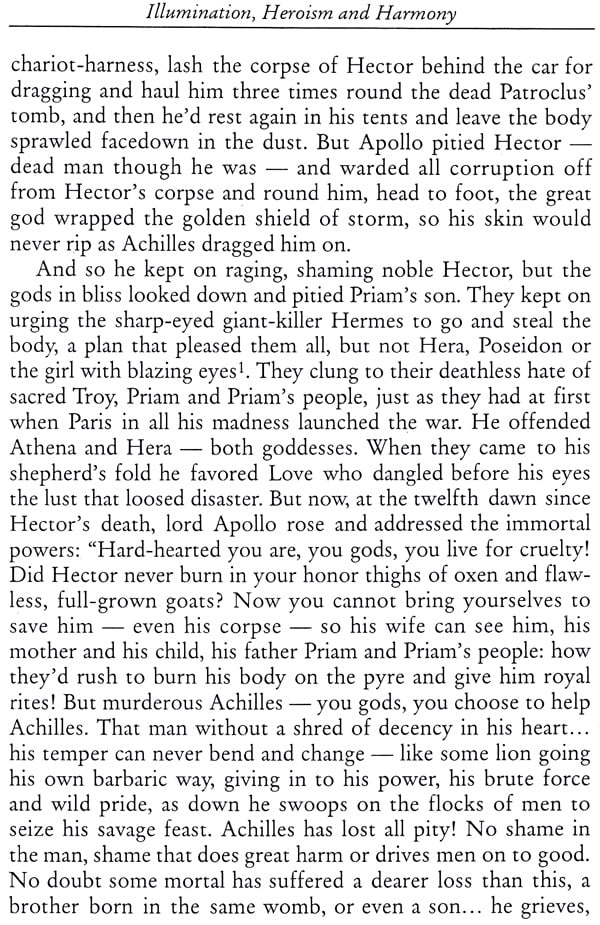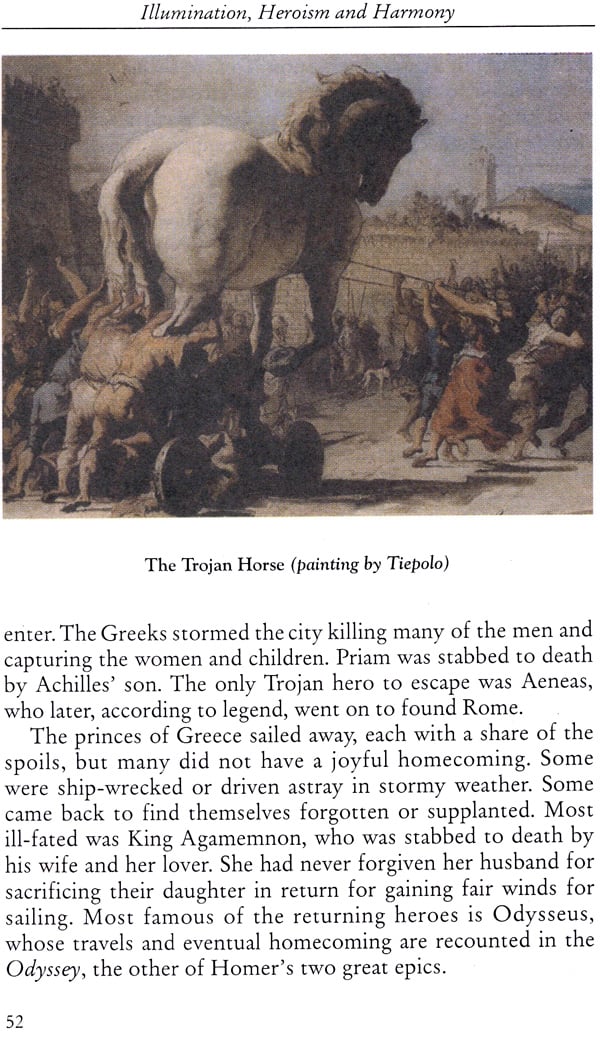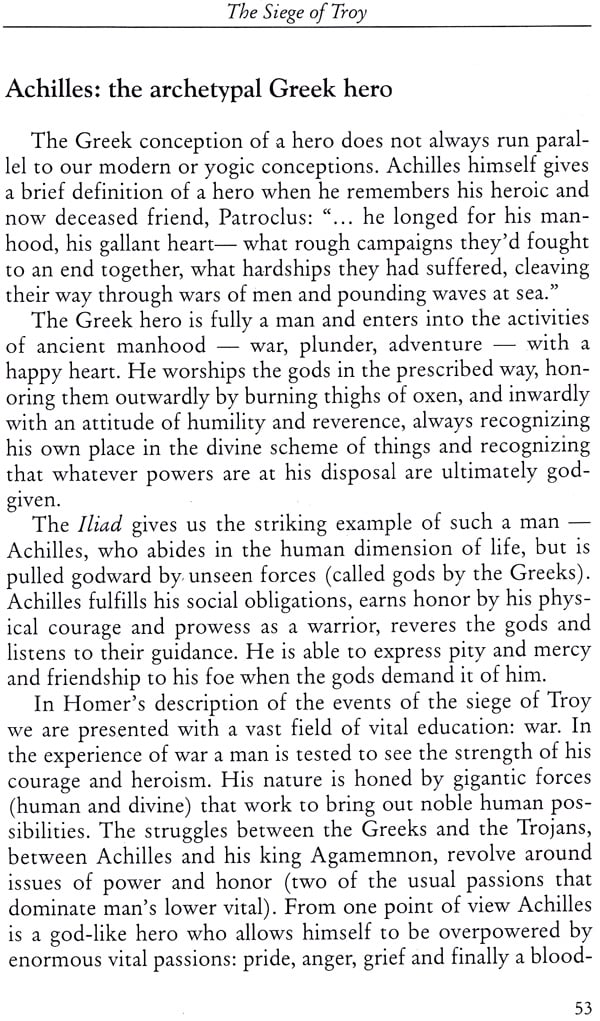
The Siege of Troy
Book Specification
| Item Code: | NAR410 |
| Author: | Kireet Joshi |
| Publisher: | Indian Council of Philosophical Research (ICPR) |
| Language: | English |
| Edition: | 2004 |
| ISBN: | 8185636885 |
| Pages: | 80 (Throughout Color and B/W Illustrations) |
| Cover: | PAPERBACK |
| Other Details | 9.00 X 6.00 inch |
| Weight | 170 gm |
Book Description
Ilumination, heroism and harmony are three major powers that can uplift life to higher and higher levels. It may be useful to explore and illustrate the meanings of these three terms by giving examples of those qualities through appropriate stories. The story of the Siege of Troy in the Iliad gives us a striking example of a hero in Achilles. He is a man who abides in the human dimension temporarily ruled by anger and grief, but is pulled godward by his own godlike nature's response to the call of the gods to work out a divine purpose at Troy. Achilles fulfills his social obligations and earns honor and glory through his physical courage and prowess as a warrior. He reveres the gods and listens to their guidance, and finally, at the climax of the Iliad, is able to express pity and mercy and compassion to his Trojan opponent, Priam. The momentous meeting between the greatest of the Greek warriors and the Trojan king has been arranged by the gods who are outraged by the fact that Achilles is defiling the body of defeated Prince Hector. Achilles is told point blank by his goddess-mother, Thetis, that he must hand over the body of Hector in return for a ransom. Achilles' immediate reaction is to submit himself to the divine will. When the noble king Priam and the long-wrathful Achilles finally meet, there is a momentous change. These bitterest of enemies, gaze at each other - soul to soul - and reach a state of compassion in which they mourn each other's losses and grieve over the losses that all men experience in the field of war. They part and each goes on to his own severe fate, but readers of generations live inspired by their reconciliation, by the example of men uplifted into a diviner sphere. It is this eternal moment that Homer has immortalized for his own people and for all men and women whoyearn to be free from the lower nature and to live in the highest part of themselves.
The task of preparing teaching-learning material for value- oriented education is enormous.
There is, first, the idea that value-oriented education should be exploratory rather than prescriptive, and that the teaching-learning material should provide to the learners a growing experience of exploration.
Secondly, it is rightly contended that the proper inspiration to turn to value-orientation is provided by biographies, auto-biographical accounts, personal anecdotes, epistles, short poems, stories of humour, stories of human interest, brief pas-sages filled with pregnant meanings, reflective short essays written in well-chiselled language, plays, powerful accounts of historical events, statements of personal experiences of values in actual situations of life, and similar other statements of scientific, philosophical, artistic and literary expression.
Thirdly, we may take into account the contemporary fact that the entire world is moving rapidly towards the synthesis of the East and the West, and in that context, it seems obvious that our teaching-learning material should foster the gradual familiarisation of students with global themes of universal significance as also those that underline the importance of diversity in unity. This implies that the material should bring the students nearer to their cultural heritage, but also to the highest that is available in the cultural experiences of the world at large.
Fourthly, an attempt should be made to select from Indian and world history such examples that could illustrate the theme of the upward progress of humankind. The selected research material could be multi-sided, and it should be presented in such a manner and in the context in which they need in specific situations that might obtain or that can be created in respect of the students. The research team at the Sri Aurobindo International Institute of Educational Research (SAIIER) has attempted the creation of the relevant teaching-learning material, and they have decided to present the same in the form of monographs. The total number of these monographs will be around eighty to eighty-five.
It appears that there are three major powers that uplift life to higher and higher normative levels, and the value of these powers, if well illustrated, could be effectively conveyed to the learners for their upliftment. These powers are those of illumination, heroism and harmony.
It may be useful to explore the meanings of these terms -illumination, heroism and harmony - since the aim of these monographs is to provide material for a study of what is sought to be conveyed through these three terms. We offer here exploratory statements in regard to these three terms.
Illumination is that ignition of inner light in which meaning and value of substance and life-movement are seized, under-stood, comprehended, held, and possessed, stimulating and inspiring guided action and application and creativity culminating in joy, delight, even ecstasy. The width, depth and height of the light and vision determine the degrees of illumination, and when they reach the splendour and glory of synthesis and harmony, illumination ripens into wisdom. Wisdom, too, has varying degrees that can uncover powers of knowledge and action, which reveal unsuspected secrets and unimagined skills of art and craft of creativity and effectiveness.
"There are four very great events in history, the siege of Troy, the life and crucifixion of Christ, the exile of Krishna in Brindavan and the colloquy with Arjun on the field of Kurukshetra. The siege of Troy created Hellas, the exile in Brindavan created devotional religion (for before there was only meditation and worship), Christ from his cross humanised Europe, the colloquy at Kurukshetra will yet liberate humanity. Yet it is said that none of these four great events ever happened.
" from Thoughts and Aphorisms - Sri Aurobindo
What is the siege of Troy and why has one of India's greatest seers and poets declared it to be one of the very great historical events, something that may be considered of global importance to Mankind? At certain moments in evolution as it expresses itself in the outer events that collectively we call history, there arises a need for the human race to re-discover the old truths of life, thought and action and to give them fresh shape. The siege of Troy marks such a moment, for that event generated the impulse which led to the creation of Hellas.
What was Hellas and what has been its contribution to the human march? Hellas is the name given to the nation, language and culture that sprung up in Greece in the fifth century BC and that in the following centuries spread its influence throughout the Mediterranean world. It eventually laid its imprint on most of the nations emerging in what was to become modern Europe.
In the Hellenic world we see the birth of the first human society which made mind its ruling power. M sound mind in a sound body" was the acknowledged aim of life in ancient Greece. By a sound mind they meant a mentality whose capacities were thoroughly developed and fitted for a noble use in all fields of life, and by a sound reason they meant a rationality that was capable of a wise and tranquil ordering of life and a rule over its passions. The Greek focus on the mind gave a special emphasis to the philosophical, aesthetical and political dimensions of life. It did not, however, recognize the spiritual dimension to the extent that we find evident in Asia.
The Greeks (as they are more commonly called by historians) were passionate seekers for Truth, but especially for the actual truth of things, for the laws of truth which could act effectively in life. The mind of the Hellene took delight in the play of reason for its own sake and followed with eagerness the many movements of mind, always seeking the hidden reality which they sensed expressed itself in rational, universal laws which could be discovered by men. This quest for Truth extended to all domains of human life. In the intellectual domain, this free play of intelligence led to the discovery of a range of philosophical systems. These systems were the base upon which many later western philosophers constructed their philosophical systems of thought. In the field of politics the Greeks understood that one of the primary conditions for the development of the perfect society was the development of the free individual. Thus, they chose to rule themselves by creating an assembly where every citizen had an equal vote. In so doing, they made the first bold experiment in democractic political forms. The life that blossomed in Athens in the fifth century BC took humanity a step further in its quest for a right balance of freedom and restraint. This initial experiment stimulated further experimentation in Europe and eventually led to the development of the modern democratic state on that continent.
** Sample Pages**









